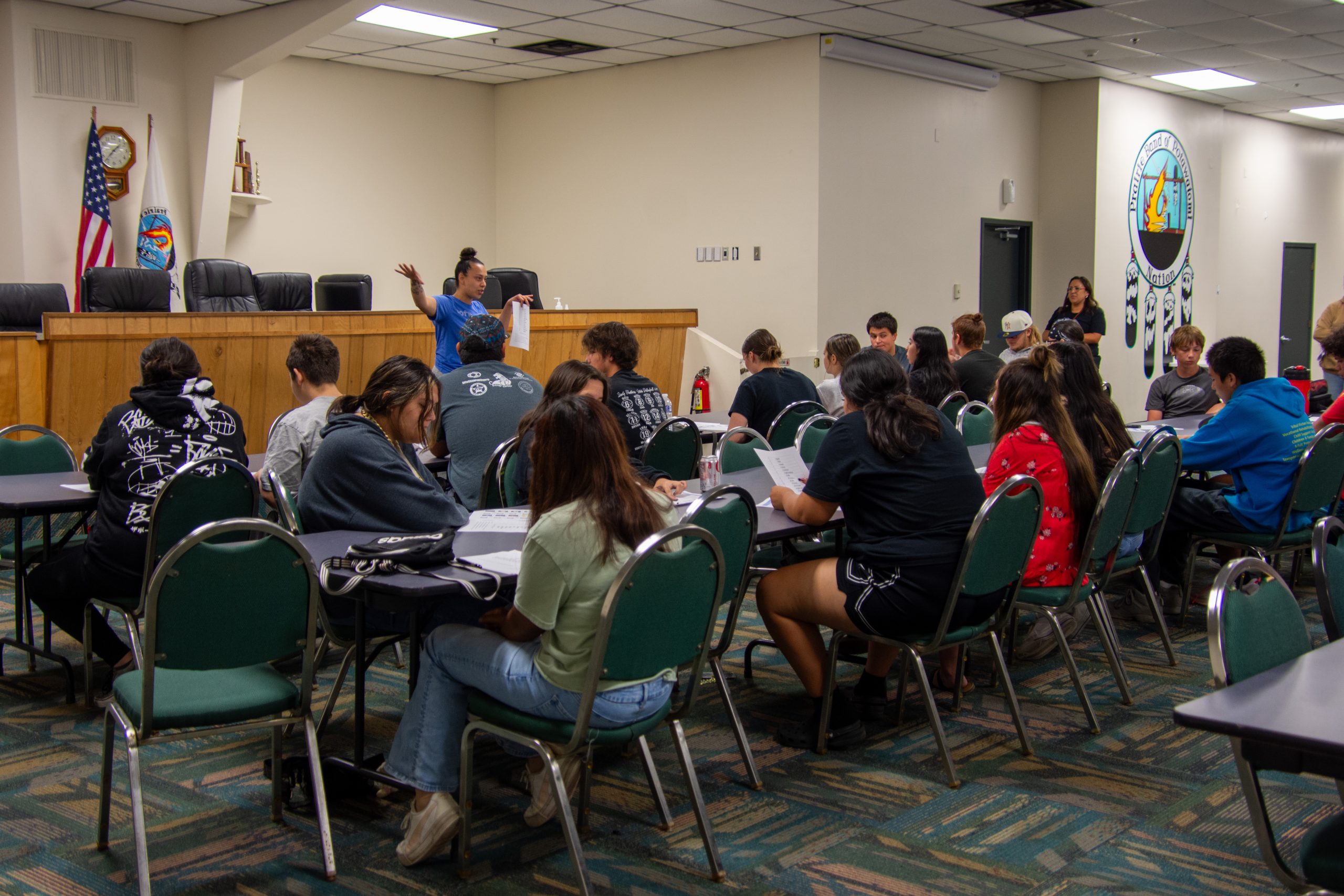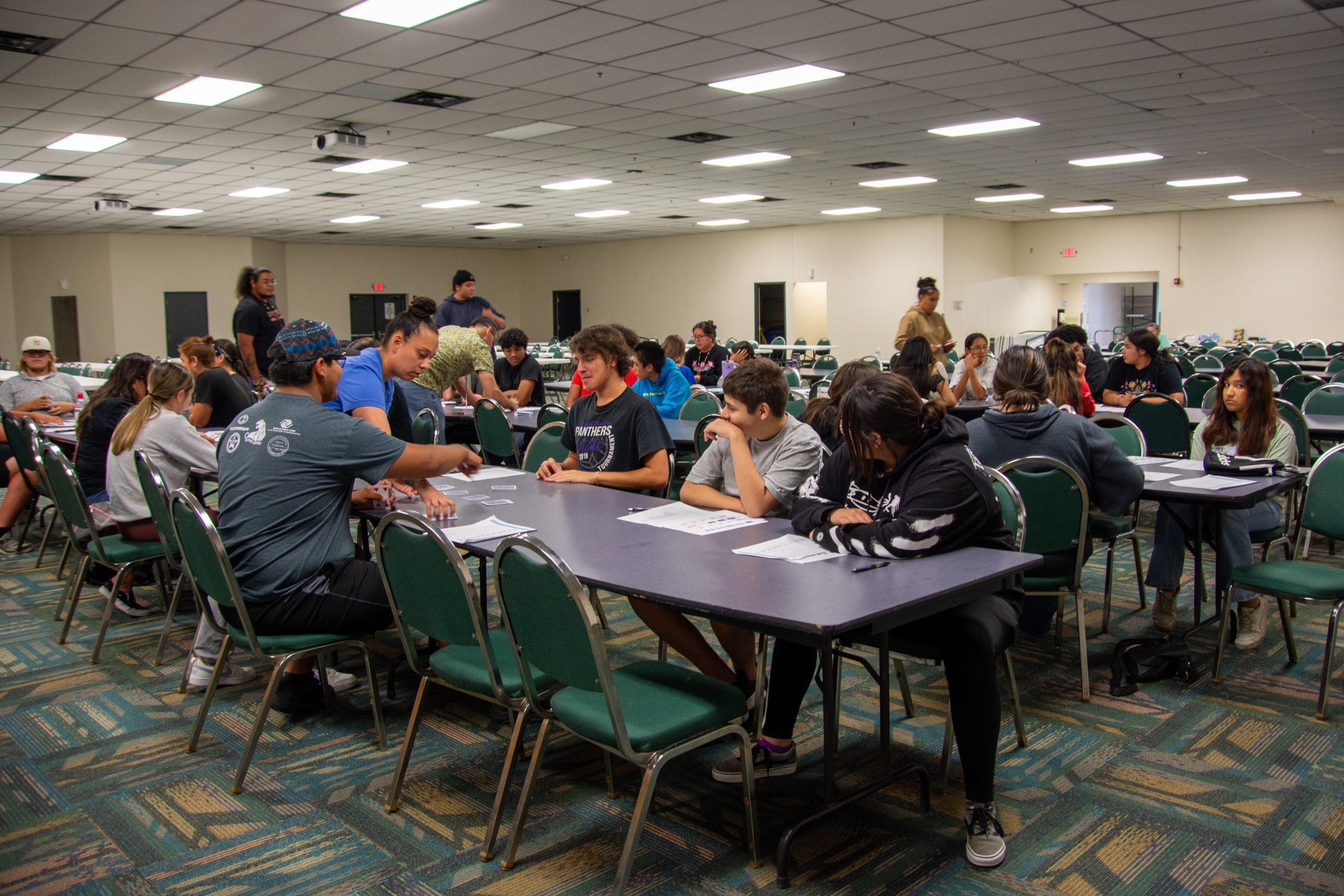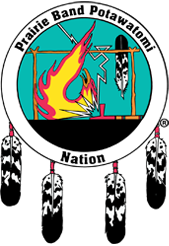Each year, the PBPN Education Department runs the Summer Youth Worker Program, which temporarily places youth from ages 14 to 18 in various PBPN departments. The goal of the Summer Youth Work Program is to instill a good work ethic in the participants, help them gain knowledge, and allow them to experience real life working environments for their future careers.

Language Apprentice Brennah Wahweotten instructs the summer youth workers during the Potawatomi Language Presentation on July 11, 2024.
The youth workers are able to learn various skills and learn about different aspects of not only the departments to which they were assigned, but other areas as well. They are also expected to follow the same work policy guidelines as the Nation’s employees, which provides them with real work experience.
“For most of them, this is their first job experience,” said Kristina Matsapto, K-12 Programs Coordinator for the Education Department.
This year, 43 candidates applied for Summer Youth Worker positions, and 37 workers completed the eight-week program. Fourteen different departments hosted the youth workers, who were assigned to their positions. To participate in the program, the youth workers submitted an application, went through an interview process, and attended orientation.
“We work to place them according to what area they are interested in and the choices that they give us,” Matsapto said.
The 14 departments that hosted the youth workers were the Boys & Girls Club, Tribal Court, Planning and Environmental Protection, Social Services, the Elders Center, the Tribal Historic Preservation Office, Construction Management, Housing, Administration, Child Care, Member Services, Commodities, the Health Center, and Building Maintenance.
Kiyah, a summer youth worker with Member Services, said that she enjoyed working for the fun experiences she has had and what she has learned on the job.
“Office etiquette is a big thing that I’ve learned,” Kiyah said. “My grandma used to work there, but I didn’t learn much about it. So actually going there and working there made me learn some things.”
At the Elder Center, summer youth workers Liza and Misa echoed this sentiment, saying that what they have learned so far will help prepare them for future jobs.
“I know when I get a job in the future, I might be scared, so I just wanted to get a feel for it,” Liza said. “I’ve learned how to talk to people and step out of your box.”
“I joined the program mainly to see how jobs are like and what I may want to do in the future,” Misa said. “It’s been wonderful. I really want to come back next year. I really like the staff and the other [youth workers.]”
Like Misa, Kiyah appreciated not just the opportunity to learn on the job but also being able to work with the regular staff.
“The people there [at Member Services] are very caring and nice, and they’re very considerate with your time,” Kiyah said. “They work with you on your hours.”
In addition to the direct work experience that the youth workers gain through their departments, they were also provided with additional training and educational opportunities.
“We incorporate presentations and training programs each year,” Matsapto said. “We want to give them more opportunities to learn new job skills, expand their knowledge and to provide cultural enrichment.”

Summer youth workers play card games to practice vocabulary during the Potawatomi Language Presentation on July 11, 2024.
The trainings held this year included a Food Handlers Course hosted by Child Care, a Financial Literacy Class held by Providence First Trust Company, a Suicide Prevention presentation by Wellness Connection Services, a Potawatomi Language Presentation by the Language Department, healthy activities with the Diabetes Prevention Program, and the option to attend the Youth Gathering of Native Americans (GONA) held at the end of the eight-week session.
Misa attended the Language Presentation and said that she really enjoyed the event, during which youth workers learned words and phrases in Potawatomi and played card games using the Potawatomi language to help them remember what they learned.
“I liked the games that we played,” she said. “I was talking about other languages that I speak, which was nice. I just want to learn my language a lot more.”
Through the department placements and additional training, the Education Department plans to expand the program to further enrich youth workers’ experience in the coming years.
“In the future, we hope to provide more project-based experiences and have goal orientated outcomes,” Matsapto said.
“We want to thank all the Prairie Band Potawatomi Nation employees who were able to work and mentor our youth in their department,” Matsapto continued. “It was great seeing all the youth workers gain knowledge, skills and experience that was created for them.”
The Summer Youth Worker Program is a popular staple of the Nation’s summer opportunities, and it is sure to attract more youth workers as the program continues to grow and develop.
“I love working, and it’s not just for the money either,” Misa said of her experience in the program. “You get to meet new people and experience new things. If you have the opportunity, people should join.”
